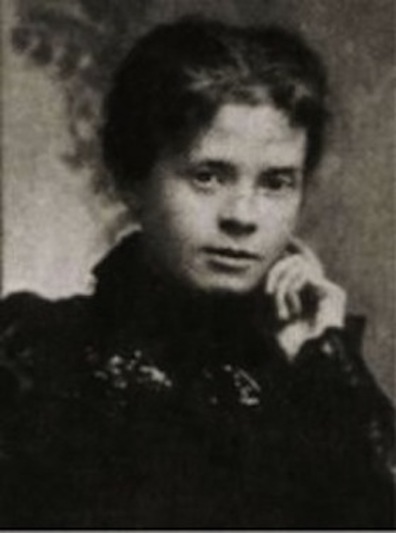"Silk of the kine and poor old woman," two phrases that
Stephen attaches to the old milkwoman in Telemachus,
are both names given to Ireland "in old times," so he is
thinking of her as a mythical representative of the nation.
The female figure evoked by the second phrase continues to
occupy his imagination, not very comfortably, later in the
chapter and later in the day.
The first phrase, from the Irish a shíoda
na mbó, means “the most beautiful of cattle.”
The t-Sean Bhean Bhocht or Shan Van Vocht, a
legendary figure from a 1790s ballad,
looks like a poor old woman to most, but to true patriots
appears as a beautiful young queen. In this instance it seems
that no true patriots are present, for we see only the “lowly
form of an immortal serving her conqueror [Haines]
and her gay betrayer [Mulligan].” And when
Haines tries speaking some
Irish to her, she mistakes it for French.
The Shan Van Vocht had been particularly on people's minds
since 1895, when two young Ulster women, Alice Milligan and
Anna Johnston, founded a monthly journal with that title. The
journal was published in Belfast from January 1896 to April
1899. It aimed to promote the centenary celebration of the
1798 Rebellion and to advance the nationalist cause of
decolonizing Ireland. It also published items of poetry,
fiction, history, folklore, and other cultural content
consistent with the aims of the Irish
Revival, some of it in Irish. Alice Milligan in
particular was a poet of some repute and a well-known figure
in Dublin. The magazine was distributed throughout Ireland.
For more on the political importance of this journal, see Nora
Shovelin's unpublished masters thesis, Political
Communication in the Shan Van Vocht Magazine, 1896-1899: An
Example of Print Culture, A Media-Product with Action-Value
(2005).
Stephen does not have a good relationship with the Poor Old
Woman. Here he looks at the milkwoman as a kind of goddess who
may have a message for him, "but scorned to beg her
favour." Soon he is resenting her attention to
Mulligan and Haines, and later in Telemachus he
appears to think of Ireland as "A crazy queen, old and
jealous," who "wants me for odd jobs."
In Circe the figure comes back as Old Gummy Granny,
a fiercely nationalistic crone who urges Stephen to fight and
die for his country. When he calls her "The old sow that eats
her farrow," resuscitating a phrase that he had coined for
Ireland in A Portrait of the Artist as a Young Man, she
responds with her own livestock image: "Ochone! Ochone! Silk
of the kine! (She wails.) You met with poor
old Ireland and how does she stand?"


